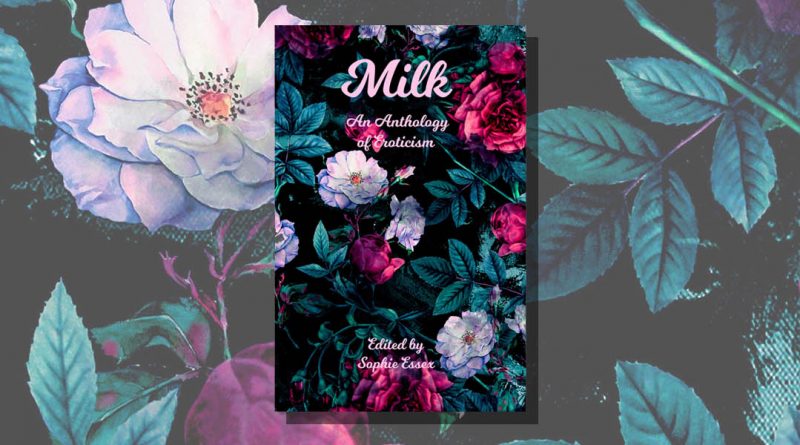Milk: An Anthology of Eroticism edited by Sophie Essex
-Reviewed by Charlie Baylis-
“The sexual act is in time what the tiger is in space”
These words from Georges Bataille hover above editor Sophie Essex’s introduction to Milk: An Anthology of Eroticism. The quote is pleasingly detached from reality: What is the tiger doing in space? How did it get there? How is a tiger in space actually similar to sex?
The best poems and stories in Milk shimmer on a similarly slanted, enchanted frequency. They shift gravity like Sarra Said-Wardell in ‘Body of Water’: ‘I look up/ as I am being flipped onto my back: /miles & miles of sky’, they linger with Francesca Kritikos in the chambers of her dazzlingly decadent ‘[In my] Jean-Luc Godard wet dream’:
I lay on a soft pile of money on a red velvet sofa in
the brightly-lit living room of a 1960s Mediterranean
villa with demonic black-eyed Modigliani nudes hung
on the walls.
And they float like Nina Ward in ‘fontanelle’ – undressed and uninhibited in happy hard core:
close your eyes into blue
& black fists plucked
nipples slick but pleasekiss it like the dent in
newborn skull lick it you’ve got
to get at least 2 fingers in
The best poems and short stories in Milk take sex to an unexpected place (remember the tiger in space). A place free of shame and embarrassment about our clumsy human forms. The message is sex positive with a liberated, catholic attitude to fucking, the body and fantasy.
One of my favourite poems in Milk is Rosie Quattromini’s ‘Millennial Pink’, which on first sigh seems as soft as candyfloss, with shades from cheap and cheerful 90s party smash Barbie Girl. The poem sings:
i dye my hair rose pink
take pictures with my rose
gold iphone in its pink glitter case
join me in this pink and plastic world
it is a cute and sexy world
The vapidity of these lines parodies the vapidity of consumer culture. Quattromini’s pink and plastic world reminds me of the wonderfully disposable ‘Life in plastic – it’s fantastic’ hook in Barbie Girl. Somewhere behind the lines is a tinge of sadness, though the surfaces of Quattromini’s poem are slick and shiny, the sadness cannot be escaped, it is as if the poem knows its destiny is to be thrown away.
One minor quibble I have with Milk is that there is a lack of diversity in writing style. Though the writers focus on different things, the majority approach sex similarly: a style that recalls Kim Addonizio, Ada Limón and other trailblazing writers of the babyboomer generation. Though this is a style I enjoy, perhaps Milk is missing is something new. Post-internet, are we really going to be shocked by content? No matter how debauched or graphic, I feel the answer is no. The space tiger needs to be blasted into a different dimension, a new galaxy must be discovered. Interestingly, on reading the contributor’s bio notes I notice many of them are based in and around Norwich, perhaps Sophie Essex could have cast the net wider for variety’s sake, a greater diversity would have been gratifying.
I deeply enjoyed reading Milk, there are hits and misses in any anthology but I was delighted to find more hits. Milk has opened my mind to a fresh constellation of young and piquant voices. I will read more work from the poets I’ve quoted from plus the excellent Fred Spollar and Jared Pollen. The sexual act is in time what the tiger is in space: No I don’t get it but I like to think the tiger is having the time of its life.


